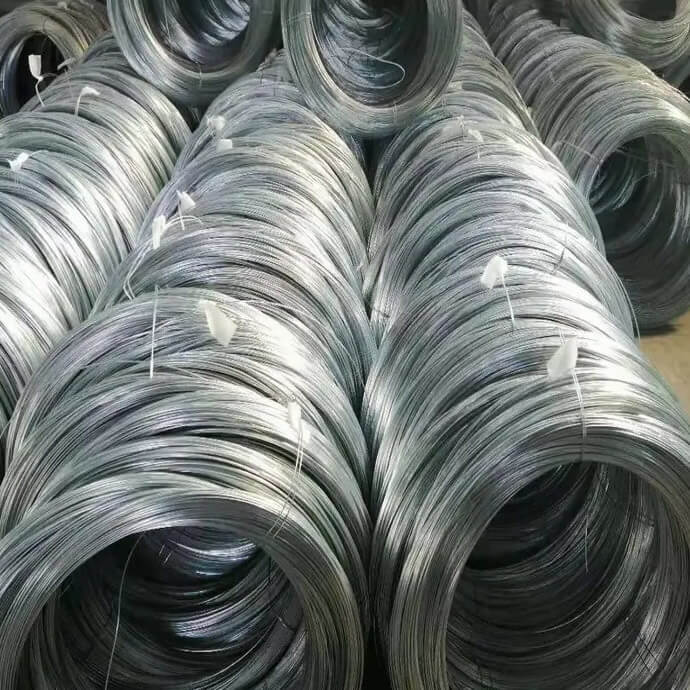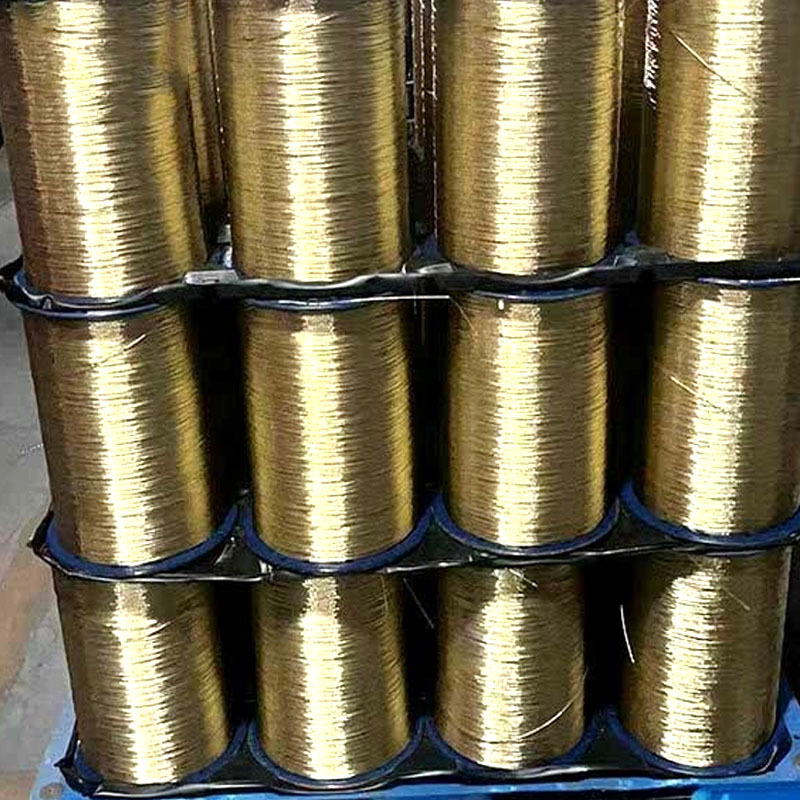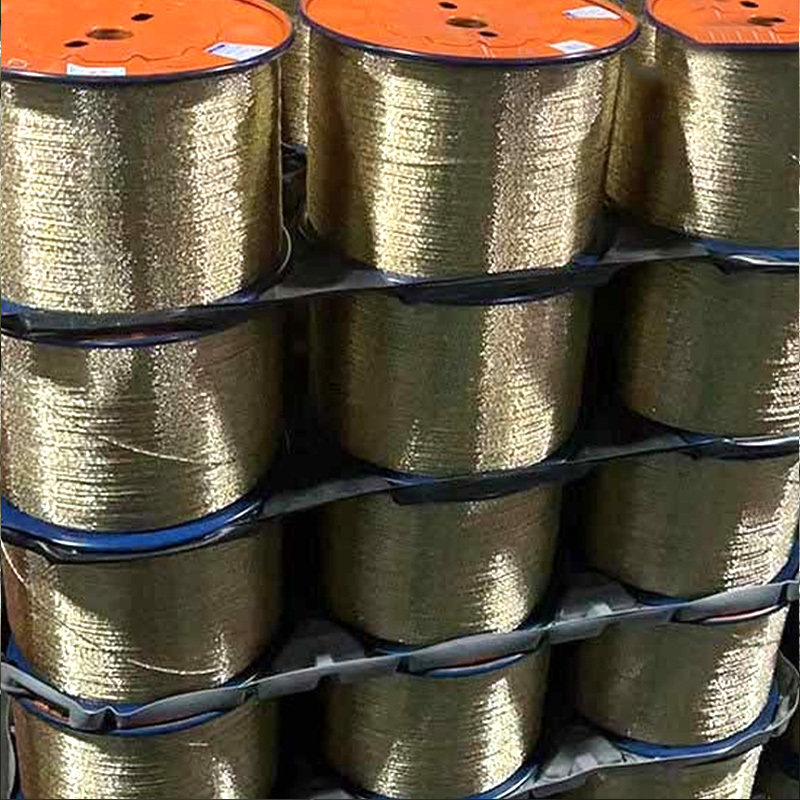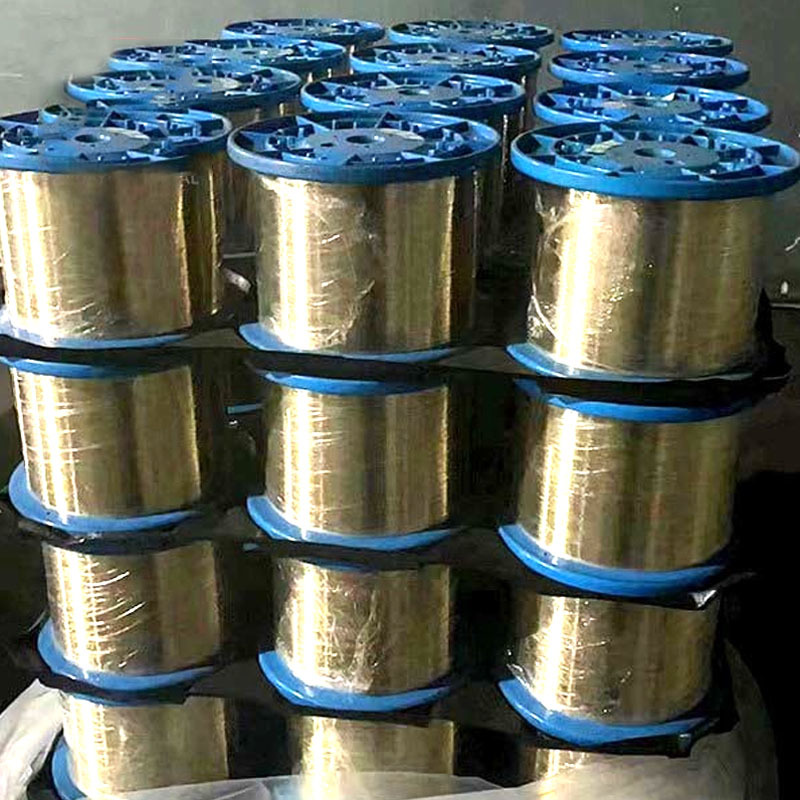Contact Us
Tel:
+86-13851950711
E-mail:
sales@wirefactory.cn
Address:
No. 16 Huide Road, Shuangtang High-end Metal Products Industrial Park, Jinghai District, Tianjin
Steel wires for the prestressing of concrete
- Commodity name: Steel wires for the prestressing of concrete
- Description
-
Steel wires for prestressed concrete main implementation of national standards GB/T5223-2014.strand Executive GB/T5224-2003 standard,American standard ASMA416,ASTMA421,British Standard BS5896,Japanese Standard JlSG3536,international standards IS06934,the European standard EN10138 or consultation by the two sides agreed to supply the technology, the following main specifications for the products and technical parameters.
This product is mainly used for prestressde and post-tensioning tech-nology in big,medium and small sized of various shapes of PC structures,and widely used for civil engineering construction of large scale railroad,high-way bridges,buildings trusses,overhead crane besms industrial and civil prefabricated concrete floor,wall board,tubular piles,powers and nuclear power station,etc.
Steel wire with plane surface size and Tolerance each meter reference quality《GB/T5223-2014》
Nominal diameter
dn/mmDiameter allowable deviation
/mmNominal cross-sectional area
Sn/mm²Reference mass per meter
/(g/m)3.00 ±0.04 7.07 55.5 4.00 12.57 98.6 5.00 ±0.05 19.63 154 6.00 28.27 222 6.25 30.68 241 7.00 38.48 302 8.00 ±0.06 50.26 394 9.00 63.62 499 10.00 78.54 616 12.00 113.1 888 PC Steel wire with spiral ribs size and Tolerance《GB/T5223-2014》
Nominal diameter
dn/mmSpiral rib
Quantity/pieceBase circle size Outer wheel profile dimensions Single auxiliary size Spiral rib lead
C/mmBase diameter
D1/mmAllowable deviation
/mmOuter contour diameter
D/mmAllowable deviation
/mmwidth
a/mm4.00 4 3.85 ±0.05 4.25 ±0.05 0.90-4.30 24-30 4.80 4 4.60 5.10 1.30-1.70 28-36 5.00 4 4.80 5.30 6.00 4 5.80 6.30 1.60-2.00 30-38 6.25 4 6.00 7.70 30-40 7.00 4 6.73 7.46 ±0.10 1.80-2.20 35-45 8.00 4 7.75 8.45 2.00-2.40 40-50 9.00 4 8.75 9.45 2.10-2.70 42-52 10.00 4 9.75 10.45 2.50-3.00 45-58 Elimination of stress-ray circular and spiral rib steel mechanical properties《GB/T5223--2014》
Nominal diameter
dn/mmtensile strength
σb/MPa
Not less thanNon proportional regulation
Elongation stress
σp0.2/MPa
Not less thanTotal under maximum force
elongation
(Lo=200mm)Bending frequency/
(Times/180 °)
Not less thanbending radius
R/mmThe initial stress is equivalent to the percentage of the nominal tensile strength,% After 1000 hoursStress relaxation rater1%
Not greater thanWLR WNR WLR WNR 3.00 1470
1570
1670
1770
18601290
1380
1470
1560
16401250
1330
1410
1500
15803.5 3 10 60
70
801.0
2.0
4.54.5
8
124.00 4 15 5.00 6.00 1470
1570
1670
17701290
1380
1470
15601250
1330
1410
15004 15 6.25 4 20 7.00 4 20 8.00 1470
15701290
13801250
13304 20 9.00 4 25 10.00 1470 1290 1250 4 25 12.00 4 30 Shape and size of two sides indented P.C.wire

d h a b R Nominal
diameterTolerance Nominal
sizeTolerance Nominal
sizeTolerance Nominal
sizeTolerance Nominal
sizeTolerance 5.00 ±0.05 4.60 ±0.50 3.50 ±0.50 3.50 ±0.50 3.50 ±0.50 7.00 6.60 GB/T 5223-2003
Type
Nominal
Diameter
mmNomina
Area
mm ²Nomina
Tensile
Strength
Not less than
MPaMin.Strength
at 0.2% Non-
proportiona
Extension
Not less than MPaElongation
ar Max.Load
(L0=200mm)
No less thanPerverse bend
L0≥500mmRelaxation WLR WNR Bend
Times
Not less than
(Times/180 °)Bend
Radius
mmnitial
Load
Nomina
Tensile
Strength1000h Value
no more thanWLR WNR Smooth
indented
helica
rib
4.00 12.57 1470
1570
1670
1770
18601290
1380
1470
1560
16401250
1330
1410
1500
15803.5% 3 10 60%
70%
80%1.0%
2.5%
4.54.5%
8%
12%4.80 18.10 4 15 5.00 19.63 6.00 28.27 1470
1570
1670
17701290
1380
1470
15601250
1330
1410
15006.25 30.68 20 7.00 38.48 8.00 50.26 1470
15701290
13801250
13309.00 63.62 25 10.00 78.54 1470 1290 1250 12.0 113.1 30 AS 1310-1987
Type Nominal
Diameter
mmTolerange
mmRange of
Tensile
Strength
Not less thanMPaMin
Strength at
0.2%Non-
proportional
Extension
Not less thanMPaMin
Elongation
after fracture
L0=250mmPerverse bend
L≥500mm
Relaxation Min Max Bend
Times
Not less than
(Times/180 °)Bend
Radius
mmInitial
Strength
Nominal
Min
Tensile
Strength1000h Value
no more thanNormal Low Cold
drawn
wire2.0 ±0.025 2000
18502250
210075% Min.
Tensile
Strength1.5% ****** ****** ****** ****** ****** 2.5 Round
wire and
indented
wire3.0 ±0.005 1700
1850
1700
1550
1700
1550
1620
17001950
2100
1950
18000
1950
1800
1870
195085% Min.
Tenslle
Strength2.5% All the
wire 3
times
without
fracture10 70%
80%6.5%
8.5%2.0%
3.0%3.0 10 4.0 3.5% 10 5.0 15 5.0 15 7.0 20 7.0 20 7.0 20 8.0 ±0,075 1450
15501700
180025 8.0 25 ASTM A421-1998
Nominal
DiameterMin
Tenslle Strength
MPaMin.Strength at 1%Extenslon
Not less than MPaMin.
Elongation
L₀=250mmRelaxation in mm Type
BA
MPaType
WA
MPaType
BA
MPaType
WA
MPaInitial Strength
Nominal Min
Tensile Strength1000h Value
no more than
Normal0.192 4.88 - 1725 - 1465 4.0% 70%
80%2.5%
3.5%0.196 4.98 1655 1725 1407 1465 0.250 6.35 1655 1655 1407 1407 0.276 7.01 1620 1620 1377 1377 BS 5896-1980
Nominal
Diameter
mmNominal
Tensile
Strengt
MPaNominal
Area
mm²Min.
Breaking
Load
kNLoad
at 1%
Elongation
kNMin.
Elongation
at Max
Load
L0.200mmDuctility Test Relaxation Reverse Bends Initial
Load
Actual
Breaking
Load1000h Value
No more thanBends Times
Not less than (times/180 °)Bend Radius
mmRelax
Class
1Relax
Class
27
71570
167038.5 60.4
64.351.3
54.33.5% 4 times for
smooth
wires
3 times for
indented
wires20 60%
70%
80%4.5%
8%
1251.0%
2.5%
4.5%6
61670
177028.3 47.3
50.140.2
42.615 5 5 1670
177019.6 32.7
34.721.8
29.515 4.5 1620 15.9 25.8 21.9 15 4
41670
167012.6 21.3
22.317.9
19.010 JIS G 3536-1994
Type Nominal
Diameter
mmDiameter
Tolerance
mmMin.
Breaking
Load
kNMin.Load at 0.2%
Non-proportional
Extension
kNMin.Elongation
L₀-100mm
%Relaxation Initial Load
Nominal
Breaking Load1000h Value no
more thanNormal Low SWPR1AN
SWPR1AL
SWPD1N
SWPD1L2.9 ±0.03 12.7 11.3 3.5 70% 8.0% 2.5% 4 ±0.04 21.1 18.60 5 ±0.05 31.9 27.90 4.0 6 44.1 38.70 7 58.3 51.00 4.5 8 ±0.06 74.0 64.20 9 90.2 78.00 SWPR1BN 5 ±0.05 33.8 29.90 4.0 7 62.3 54.90 4.5 8 ±0.06 78.9 69.10 PC WIRE-Low Relaxation
STANDARD Gade
(Mpe)Diameter (mm) Nomi
nal
Area
(mm²)Weight (kgk) Breaking Load
(min)
(kN)Yield Load (min)(kN) Indented
Deph
(mm)Elogatio
n(%)Reverse Bend
(times)Staightness
mm.Relaxation at 1000 Hr.(%mm)
lnitial Load (%)Norminal Dia Nomind Tolerince 0.1% 0.2% 0.3% 60 70 80 JIS G3536-1999 SWPDIL
Deformed
SWPRILR
ound4.00
5.00
6.00
7.00
8.00
9.00±0.04 12.57 98.7 21.1 18.6 ≥3.5
≥4.0
≥4.0
≥4.5≤2.5 II ±0.05 9.64 154.0 31.9 27.9 ±0.05 28.27 222.0 44.1 38.7 ±0.05 38.48 302.0 58.3 51.0 ±0.05 50.27 395.0 74.0 64.2 ≥4.5 ±0.06 63.62 499.0 90.2 78.0 ≥4.5 BS5896-1980 1770 4.00 ±0.04 12.6 98.9 ±2.0 22.3 18.5 19.0 0.07-0.17 ≥3.5 4 for Plain
wig.3 for
Indented wireNot exceed
30 mm,Over
lmgth 1 m≤1.0
(A)≤2.5 II ≤4.5 II 1670 4.00 40.04 12.6 98.9 ±2.0 21.0 17.5 17.9 0.07-0.17 1620 4.50 ±0.05 15.9 125.0 ±2.7 25.8 21.4 21.9 0.07-0.17 1860 5.00 ±40.05 19.6 154.0 ±3.1 36.5 30.3 31.0 0.07-0.17 1770 5.00 ±40.05 19.6 154.0 ±3.1 34.7 28.8 29.5 0.07-0.17 1670 5.00 ±10.05 19.6 154.0 ±3.1 32.7 27.2 21.8 0.07-0.17 1770 6.00 ±0.05 28.3 222.0 ±3.7 50.1 41.6 42.6 0.10-0.20 1670 6.00 ±40.05 28.3 222.0 ±3.7 47.3 39.3 40.2 0.10-0.20 1670 7.00 ±40.05 38.5 302.0 ±4.3 64.3 53.4 54.7 0.10-0.20 1570 7.00 ±0.05 38.5 302.0 ±4.3 60.4 50.1 51.3 0.10-0.20 AS/NZS 4672-
20071770 4.00 12.6 98.9 ±2.0 22.3 18.5 19.0 ≥3.5 4 for Plain
wire.3 for
Indented wireNot exceed
25 mm,Over
length 1 m≤3.0 II 1770 5.00 19.6 154.0 ±3.1 34.7 28.8 29.5 1670 5.00 9.6 154.0 ±3.1 32.7 27.2 27.8 670 6.00 28.3 222.0 ±3.7 47.3 39.3 40.2 670 7.00 38.5 302.0 ±4.3 64.3 50.1 51.3 1570 8.00 50.3 395.0 ±5.9 79.0 65.6 67.1 470 9.00 63.6 499.0 ±7,2 93.5 74.8 76.7 EN10138-2004 Y1860C 4.00 12.6 98.4 ±2.0 23.4 20.8 0.06-0.13
0.06-0.13
0.06-0.13≥3.5 4 for Plain
wire.3 for
ndented wireNot exceed
25 mm,Over
lngth 1 m≤4.5 I W1770C 4.00 12.6 98.4 ±2.0 22.3 19.6 Y1770C 5.00 19.6 153.1 ±3.1 34.7 30.5 Y1670C 5.00 19.6 153.1 ±3.1 32.7 28.8 0.06-0.13 Y1770C 6.00 28.3 221.0 ±4.4 50.1 44.1 0.09-0.16 Y1670C 6.00 28.3 221.0 ±4.4 47.3 41.6 0.09-0.16
0.09-0.16
0.09-0.16Y1670C 7.00 38.5 300.7 ±6.0 64.3 56.6 Y1570C 7.00 38.5 300.7 ±6.0 60.4 53.2 ASTM A421-
2005WA 4.98 ±0.0
519.48 152.9 33.60 28.54 ≥4.0 Not exceed 3
nch,Over
length 60
inch≤3.5 II 6.35 31.67 248.6 52.41 44.56 7.01 38.59 302.9 62.52 53.14 BA 4.98 19.48 152.9 32.24 27.41
44.56
53.146.35 31.67 248.6 52.41 7.01 38.59 302.9 62.52 1=%OF ACTUAL BREAKING LOAD II-%OF MINIMUM BREAKING LOAD
Steel wire stands as a cornerstone of modern engineering, embodying strength, resilience, and adaptability in its very essence. In this concise exploration, we uncover the distinctive features of steel wire, underscoring its diverse applications and indispensable role across various industries.
At its core, steel wire is forged from high-grade steel alloys, meticulously crafted to deliver unparalleled tensile strength and durability. Its robust construction enables it to withstand immense loads and forces, making it an indispensable component in structural frameworks, mechanical assemblies, and industrial machinery.
One of the hallmark traits of steel wire is its exceptional flexibility despite its formidable strength. This unique characteristic allows it to be seamlessly integrated into intricate designs and complex configurations, facilitating seamless installation and optimal performance in diverse environments.
Moreover, steel wire's corrosion-resistant properties make it exceptionally well-suited for outdoor applications, where exposure to moisture, chemicals, and harsh weather conditions is unavoidable. Its protective coating ensures long-term durability, safeguarding against rust and degradation even in the most demanding environments.
In the realm of construction, steel wire serves as a versatile building material, employed in an array of applications ranging from reinforcing concrete structures to suspending overhead cables and erecting fences. Its high tensile strength and malleability allow for precise shaping and positioning, enabling architects and engineers to realize their vision with confidence.
In the automotive industry, steel wire plays a crucial role in the fabrication of wire harnesses, springs, and other components essential for vehicle performance and safety. Its resilience and conductivity ensure reliable electrical connections, while its ability to withstand vibrations and mechanical stress enhances overall durability and longevity.
Furthermore, steel wire finds extensive utility in the manufacturing sector, where it is used in the production of industrial machinery, tools, and equipment. Its strength and versatility make it an indispensable resource for fabricating conveyor belts, lifting cables, and precision components, driving efficiency and productivity in manufacturing processes.
Beyond its industrial applications, steel wire serves as a creative medium for artists and craftsmen, who harness its inherent properties to sculpt intricate sculptures, jewelry, and decorative accents. Its ability to be shaped, bent, and formed with precision allows for the realization of intricate designs and imaginative creations.
In summary, steel wire emerges as a quintessential building block of modern engineering, embodying strength, flexibility, and durability in equal measure. From towering skyscrapers to intricate artworks, its versatility and reliability continue to shape the landscape of innovation and creativity, serving as a testament to human ingenuity and perseverance.
Key words:
Zinc-coated wire | Galvanized Wire | Spool Wire | Barbed Wire | Steel strand
Get A Quote
Note: Please leave your email address, our professionals will contact you as soon as possible!






